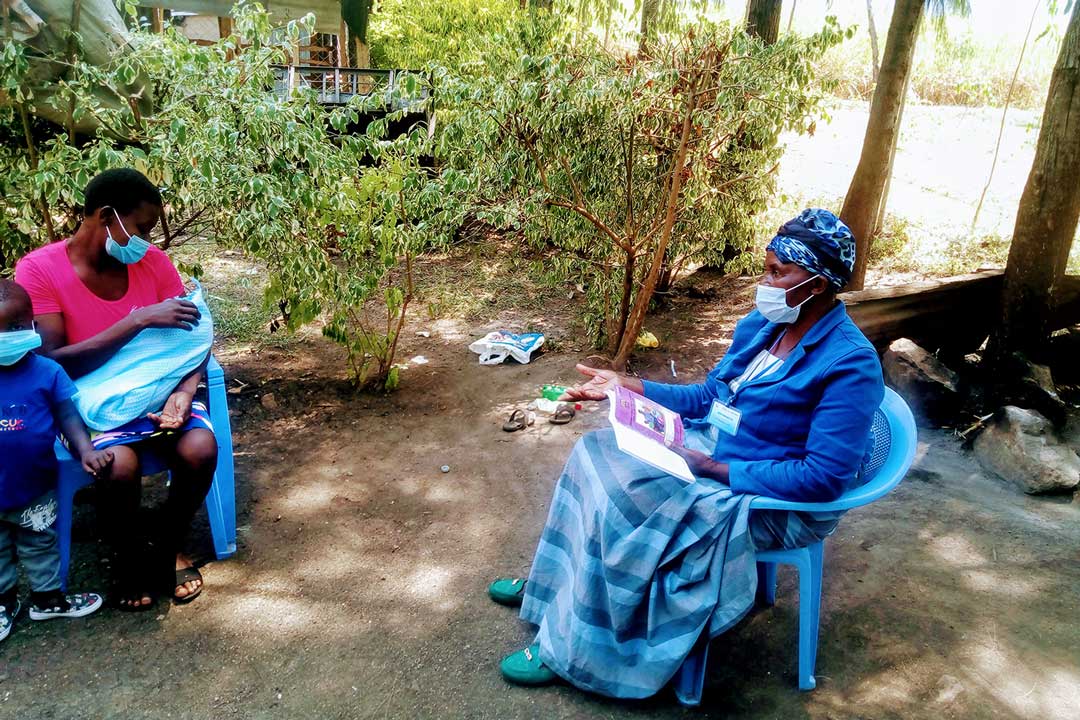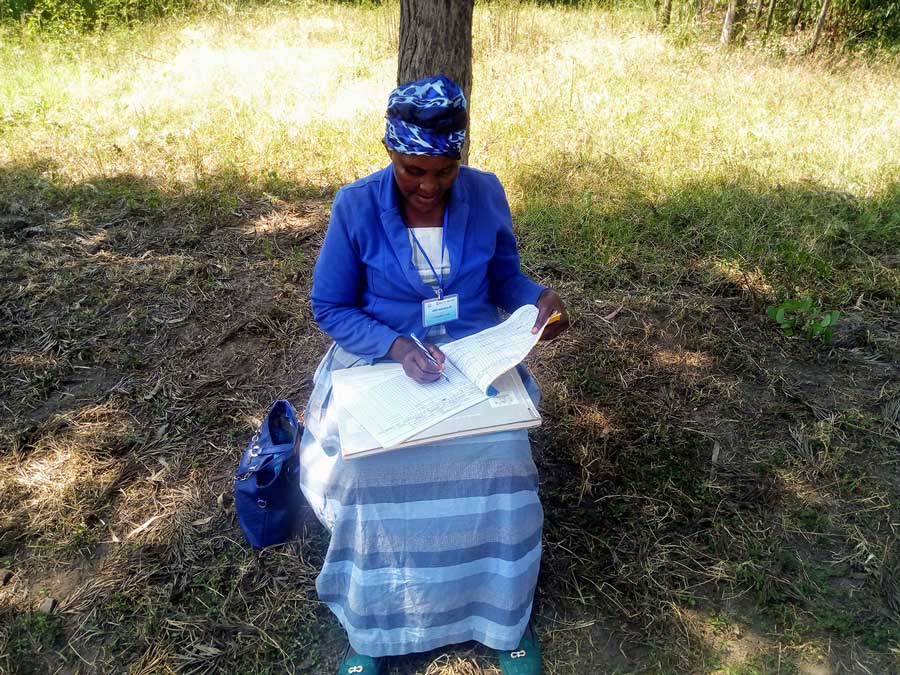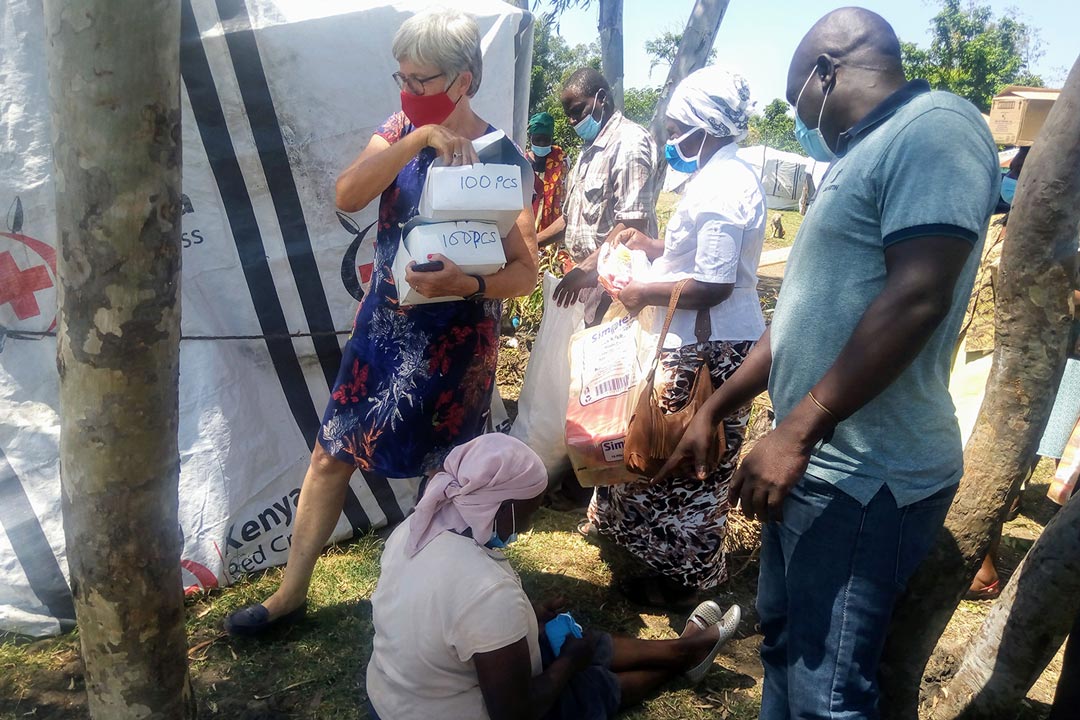Pen and paper in a digital age: tracking childhood immunisation in Kenya
It may not be high tech, but it works. Kenyan community health volunteers use tracking books to ensure that children receive routine vaccinations.
- 14 July 2021
- 4 min read
- by Angeline Ochieng

Fransiscah Amolo gently flips through the pages of her immunisation tracking tool book and scribbles something in her notes. The 60-year-old then returns the two books to her handbag and continues to make her way through Holo village, in Kenya’s Muhoroni Sub-County.
From time to time, as she walks, she happily waves at various women seated under trees to protect themselves from the scorching sun. A number of children, however, run in the opposite direction when they see her.
Ms Amolo continues her visits to monitor the child’s growth and development for five years. When she comes across children who have missed vaccinations, she notes them down and refers them to a health centre
She stops in front of a tin-roofed mud-house and knocks twice. A young lady, who appears to be in her early twenties, emerges from the dimly lit room and gives her a hearty smile. She goes back into the house, brings out three plastic chairs and invites us to sit.
Today, Amolo, a community health volunteer (CHV), is here to see the young mother, Emily Atieno, for a routine baby check-up.

Photo credits /Angeline Ochieng
Ms Atieno gave birth to her second born daughter on 7 June, 2021 at Nyangoma health centre, but her baby had been discharged without administration of the tuberculosis vaccine.
“I left the hospital with my daughter, Caroline, not vaccinated. Two days later Ms Amolo was here to see how the baby and I were doing. When she checked Caroline’s clinic book and realised she hadn’t been vaccinated, Ms Amolo immediately sent me to the Ogen dispensary to ensure Caroline is immunised,” says Atieno.
For Amolo, the immunisation tracking tool book, which was provided to her by the Ministry of Health to track infant vaccination and ensure that all are fully vaccinated, is key. She says, “Once a woman or a young girl in my area conceives, I note down their personal details including name, phone contacts, expected delivery date and the health facility attended. With this information, I am able to track newborns. I follow up with the mothers regularly until the babies have received all the vaccinations.”

Photo Credit / Angeline Ochieng
Ms Amolo continues her visits to monitor the child’s growth and development for five years, and, when she comes across cases of children who have missed vaccinations, she notes it down and refers them to a health centre. With the COVID-19 pandemic, she has limited her visits but still maintains contact telephonically.
“At the moment, I have four new mothers whose babies are barely a month old and another six expecting,” she says.
Have you read?
While she receives a small monthly stipend as a community health volunteer, her motivation to help mothers and their babies is a desire to spare them her own ordeal.
“When I gave birth to my children, we did not have a health centre around,” she says. “Two of my children were born at home, and I had to go a long way for vaccinations.”
Even with health centres closer at hand, some children still miss out vaccinations. “If they fail to report to the hospital, we visit them at home. We often have to be harsh with them for endangering the lives of their babies,” she says.
In addition to tracking immunisations, Amolo and other CHVs also educate the women on the importance of early childhood immunisation and the potential consequences of not having their children immunised. She certainly feels that the increased awareness is having an impact, with many women preferring to give birth in health facilities rather than with traditional birth attendants (TBAs).
Amid the COVID-19 pandemic, the CHVs have also been reinforcing the importance of sanitation and other non-pharmaceutical interventions, which the hospitals and health centres are better equipped to follow.
“We always tell them that, while at hospital, they should have their mask on and social distance. In addition, the health workers attending to them must be dressed in protective gear,” she concludes.
According to a Kisumu County public health worker Mr Amos Otieno, the county has been supportive, providing the CHVs with personal protective equipment, like sanitisers and face masks, and a monthly stipend.
He adds, “The work that they do is important. The data that is collected by the volunteers provides the county with clear records of immunised children, immunisation defaulters and child mortality, amongst other information.”






